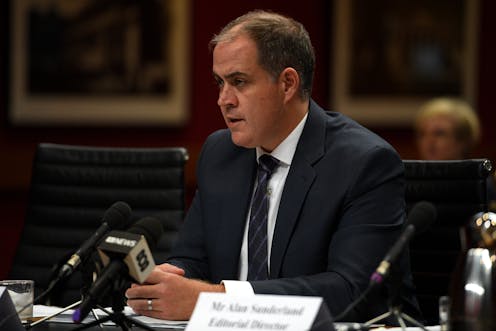David Anderson's appointment as ABC managing director is a relief and will further steady the broadcaster
- Written by Denis Muller, Senior Research Fellow in the Centre for Advancing Journalism, University of Melbourne

The appointment of David Anderson as managing director and editor-in-chief of the ABC is something of a relief.
It is an important early signal of how the new ABC chair, Ita Buttrose, is giving effect to her promise of bringing stability to the ABC after the chaotic events of last September in which the broadcaster lost both its chair, Justin Milne, and managing director Michelle Guthrie.
While nothing is known about the alternative candidates, quite a bit is known about Anderson.
Read more: Ita Buttrose's appointment as new ABC chair a promising step in the right direction
He has 30 years’ experience with the ABC. Before being appointed acting managing director after Guthrie’s sudden sacking, he was responsible for all ABC radio music and broadcast television networks and for its on-demand products and services.
He seems to be well-regarded inside the organisation. The director of news, Gaven Morris, tweeted “order restored”. The comedian Shaun Micallef posted a YouTube video clip from one of his sketches, the making of which required human ballast to tilt the set on an angle. Anderson, he said, came down from his office and lent his heft to the task.
It can be safely anticipated that the ABC’s critics will see in this a cosy insiders’ choice designed to ensure the organisation remains self-referential in outlook and impervious to conservative influences.
It will be entertaining, in a droll kind of way, to see if epithets such as “the ABC collective”, “Trotskyite” and “sheltered workshop” get another run as they did when Russell Balding replaced Jonathan Shier after the latter’s chaotic reign came to an abrupt end in 2001.
Anderson’s appointment has many echoes of Balding’s. Balding too was an insider – he had been general manager of finance. He too was appointed following a chaotic reign and abrupt departure. He, too, was seen as a safe pair of hands who would restore stability, as indeed he did.
Like Balding, Anderson also inherits an ABC facing acute financial pressures and a recent history of hostility from the federal government.
However, a structural problem that was central to the way the Milne-Guthrie debacle played out is yet to be fixed.
That problem is the combining of the roles of managing director and editor-in-chief in the one person. Guthrie was hopelessly ill-suited by experience and inclination to be editor-in-chief. Anderson, whatever his other qualities, has no journalistic experience either.
Read more: ABC inquiry finds board knew of trouble between Milne and Guthrie, but did nothing
Mark Scott, who was editor-in-chief at the then Fairfax newspapers before being appointed managing director of the ABC, was exceptionally well qualified for both jobs. He has been reported as saying the chief executive of the broadcaster needs to embrace the editor-in-chief role. Scott said:
The chief executive is responsible for everything that goes to air and you cannot have a structure where finally the chief executive is not responsible.
While this is true, in most media organisations it is achieved differently. The editor-in-chief answers to the board through the chief executive; the board and chief executive answer to the shareholders – or, in the ABC’s case, to the government.
Moreover, under a structure like that, the editor-in-chief is not a board member and therefore is not a party to board decisions with the associated requirements of board solidarity.
In these two important ways, the editor-in-chief is shielded from becoming compromised, enabling him or her to make news decisions independent of corporate interests. It is called editorial independence and is the cornerstone of good journalism.
Read more: ABC inquiry finds board knew of trouble between Milne and Guthrie, but did nothing
Strong editorial leadership founded on independence liberates editors and journalists at every level to tell stories that matter to the public interest without looking over their shoulders fearful of politically inspired retribution.
There has never been a time in Australia’s modern history when there was a greater need for an editorially robust ABC.
In December 2018, Fairfax newspapers were swallowed up into the Nine entertainment conglomerate, with consequences for their editorial quality that are yet to be seen.
Fairfax controlled about 20% of metropolitan daily newspaper circulation in Australia.
News Corp, which controls about two-thirds of this circulation, has morphed into a hybrid of news service and political propaganda machine, its usefulness as a news provider declining in proportion as its propagandising mission has grown.
Fairfax’s regional newspapers were acquired last week by a former Fairfax journalist and corporate executive, Antony Catalano, along with a financial backer in the form of Thorney Investment Group.
While that provides Australia with some sorely needed diversity in media ownership, it is unlikely to have a significant impact on journalism at the national level.
Without a strong ABC news and current affairs service, the fourth estate of Australia’s democracy would be severely diminished.
The appointment of a new chair and a new managing director means that two of the three salient features of the ABC’s post-Milne landscape are in place.
The third is the composition of the board as a whole. The surviving members came out badly from the majority report of the Senate inquiry into political interference in the ABC, which was published in April.
The report found that the catalogue of events leading up to the sacking of Guthrie and the resignation of Milne “may give rise to the perception that the ABC Board had not been sufficiently active in protecting either the ABC’s independence from political interference or its own integrity”.
What, if anything, Buttrose does about that remains to be seen.
Authors: Denis Muller, Senior Research Fellow in the Centre for Advancing Journalism, University of Melbourne




